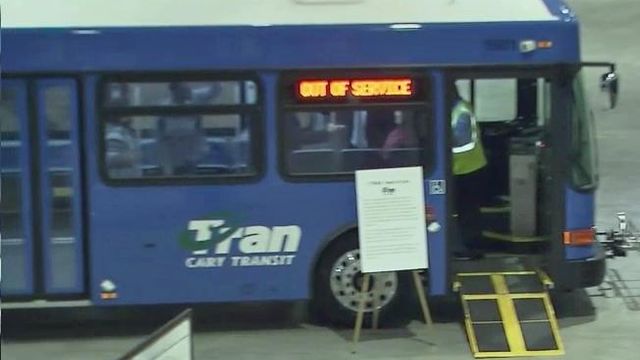Lots of buses, a little rail in Wake transit plan
After a year of meetings, the public will get its first look Tuesday at the recommended transit plan designed to improve and expand transit options in Wake County over the next decade.
Posted — UpdatedAn open house was being held at the Raleigh Convention Center from 4 to 8 p.m., and it gave residents a good idea of what they'd be getting if the plan is adopted.
The plan, which has an estimated cost of $2.3 billion, would significantly expand bus service, with more routes covering a wider area and extended hours.
It also calls for a bus rapid transit system with dedicated travel lanes. These buses would provide riders with reliable, fast transportation using a mix of technology, dedicated lanes and other tools designed to avoid congestion.
In heavily populated areas, buses would arrive every 15-minutes and towns out in the county would see less frequent routes.
"This has the opportunity to be an absolute game changer," said Wake County Commissioner Matt Calabria."There is something in it for you no matter where you live in Wake County."
The plan would also include a commuter rail transit system. It would use existing rail corridors from Garner to Research Triangle Park to create train connections around the Triangle and central part of the state.
"This plan will enable our fast-growing county to remain one of the best places to live and work in the country by helping people of all ages get where they need to go more easily and efficiently," said County manager Jim Hartmann in a statement.
The plan is promising to help with traffic along Interstate 40 as well.
"We are going to face congestion challenges if we don't head off those problems and if we don't plan ahead, but the most important thing is we have to get started," said Calabria.
Kelly Collins was looking for another way to move her family around and hoped this new plan would be the answer to gaining better access to work and school through public transportation. Calabria believes the plan will do that and more.
"It really spurs on the economy, it revitalizes downtown, it expands the tax base and it means our economy is more vibrant because we are attracting not only cutting edge businesses, but cutting edge workers," he said.
Wake County commissioners could adopt the plan as early as next spring. Commissioners could end up placing a half-cent sales tax referendum on the November 2016 ballot, a step that could bring in $60 to $70 million a year to fund the program.
• Credits
Copyright 2024 by Capitol Broadcasting Company. All rights reserved. This material may not be published, broadcast, rewritten or redistributed.






